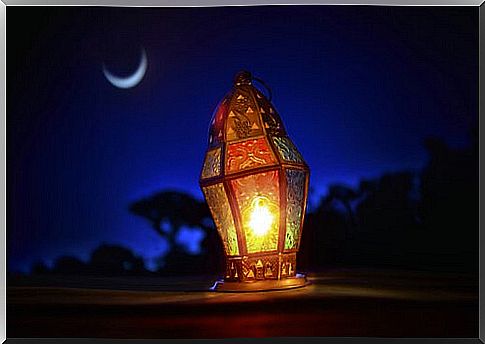5 Amazing Buddhist Tales That Make You Wiser

Buddhism comes from the word “budhi”, which means awakened. Therefore, Buddhist philosophy is considered to be the philosophy of the “process of awakening”. A process by which you not only open your eyes, but also the rest of your senses and your intellect. You can do this in many different ways, one of which is through Buddhist tales.
These five Buddhist tales will encourage you to put apathy behind you, develop greater understanding and become a wiser person. We hope you enjoy them and take advantage of all the wisdom they contain.
The professor arrived at the Zen Master’s house and introduced himself by boasting about all the titles and diplomas he had acquired during his many years of study. The professor then told about the reason for his visit, which was to learn all the secrets of Zen wisdom.

Instead of giving him explanations, the master invited him to sit down and served him a cup of tea. When the cup was filled, the wise old man, seemingly distracted, continued to pour in, so that the liquid spilled onto the table.
The professor could not help himself, but exclaimed: “The cup is full, no more tea can fit in it.” The master put down the teapot and confirmed: “You are like a cup, you have arrived filled to the brim with opinions and prejudices. If your cup is not empty, you will not be able to learn anything. ”
The first of these five Buddhist tales teaches us that with a mind full of prejudices, it is impossible to learn and consider new beliefs. It is necessary to “empty oneself” of old regulations and be open to new lessons.
The Buddha transmitted his teachings to a group of disciples when a man came forward and insulted him, in order to attack him. Under the gaze of all present , the Buddha reacted with the greatest serenity, and remained completely still and silent.
When the man left, one of his disciples, angry at the behavior, asked the Buddha why he had let the stranger insult him in such a way.
The Buddha calmly replied, “If I give you a horse as a gift, but you do not accept it, whose horse is it? After a few moments of hesitation, the disciple replied, “If I did not accept it, it would remain yours.”
The Buddha nodded and explained that some people may decide to waste their time giving us insults, but that we can choose whether we want to accept them or not, just as we can do with any other gift. “If you take it, you accept it. And if not, the one who insulted you with the insult is left in their hands. ”

Two Buddhist monks, an old and a young, strolled outside the monastery near a flooded river. A beautiful woman approached the monks and asked them for help crossing the river.
The young monk was horrified at the thought of taking her in his arms, but the old monk picked her up very naturally and carried her over. Then the two monks continued their walk.
The young man could not stop thinking about the incident and finally exclaimed: “Master! You know you made a vow of celibacy. We are not allowed to touch a woman in that way. How could you take a beautiful woman in your arms, let her put her arms around your neck, her breasts against your chest, and carry her across the river like that? ” The old man replied, “My child, you are still carrying her!”
The third of these Buddhist tales helps us understand that we sometimes carry with us the past, with feelings of guilt or resentment, and make it even heavier than it really was. By accepting that the incident is not part of our now, we can free ourselves from a great emotional burden.
One afternoon, some people saw an old woman looking for something outside her cabin. “What’s going on? What are you looking for?” the people asked her. “I dropped a needle,” she replied. All the people present began to look for the needle with the old woman.
After a while, someone commented: “The street is very long and the needle is very small, so why do not you tell exactly where you dropped it?” “In my house,” said the old woman.
“Have you gone crazy? If you dropped the needle in your house, why are you looking for it out here? ” the people asked her. “Because there is sunlight here, but nothing in my house,” she stated.
The fourth of our Buddhist tales reminds us that we often, for convenience, search for things on the outside that are actually on the inside. Why do we seek happiness outside ourselves? Did we lose that one?

No one has developed the benevolence and compassion that the Buddha did during his time. Among his cousins was the devil Devadatta, who was always jealous and determined to make him look bad. He was even willing to kill him.
When the Buddha came walking one day, his cousin Devadatta threw a heavy stone at him from a hill. The stone fell next to the Buddha and Devadatta failed to take his life. The Buddha never let his smile disappear from his face, not even after realizing what had happened.
Days later, the Buddha ran to his cousin and greeted him warmly. Very surprised, Devadatta asked him, “Aren’t you angry?” “No, of course not,” the Buddha assured him.
Still shocked, Devadatta asked him, “Why not?” and the Buddha confirmed, ” Because you are no longer the one who threw the stone, and I am no longer the same one who was there when the stone was thrown.”









